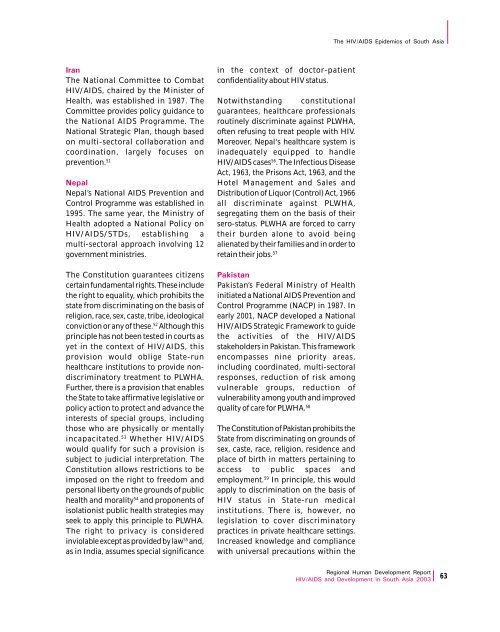Download Report - UNDP Asia-Pacific Regional Centre - United ...
Download Report - UNDP Asia-Pacific Regional Centre - United ...
Download Report - UNDP Asia-Pacific Regional Centre - United ...
You also want an ePaper? Increase the reach of your titles
YUMPU automatically turns print PDFs into web optimized ePapers that Google loves.
The HIV/AIDS Epidemics of South <strong>Asia</strong>IranThe National Committee to CombatHIV/AIDS, chaired by the Minister ofHealth, was established in 1987. TheCommittee provides policy guidance tothe National AIDS Programme. TheNational Strategic Plan, though basedon multi-sectoral collaboration andcoordination, largely focuses onprevention. 51NepalNepal’s National AIDS Prevention andControl Programme was established in1995. The same year, the Ministry ofHealth adopted a National Policy onHIV/AIDS/STDs, establishing amulti-sectoral approach involving 12government ministries.The Constitution guarantees citizenscertain fundamental rights. These includethe right to equality, which prohibits thestate from discriminating on the basis ofreligion, race, sex, caste, tribe, ideologicalconviction or any of these. 52 Although thisprinciple has not been tested in courts asyet in the context of HIV/AIDS, thisprovision would oblige State-runhealthcare institutions to provide nondiscriminatorytreatment to PLWHA.Further, there is a provision that enablesthe State to take affirmative legislative orpolicy action to protect and advance theinterests of special groups, includingthose who are physically or mentallyincapacitated. 53 Whether HIV/AIDSwould qualify for such a provision issubject to judicial interpretation. TheConstitution allows restrictions to beimposed on the right to freedom andpersonal liberty on the grounds of publichealth and morality 54 and proponents ofisolationist public health strategies mayseek to apply this principle to PLWHA.The right to privacy is consideredinviolable except as provided by law 55 and,as in India, assumes special significancein the context of doctor-patientconfidentiality about HIV status.Notwithstanding constitutionalguarantees, healthcare professionalsroutinely discriminate against PLWHA,often refusing to treat people with HIV.Moreover, Nepal's healthcare system isinadequately equipped to handleHIV/AIDS cases 56 . The Infectious DiseaseAct, 1963, the Prisons Act, 1963, and theHotel Management and Sales andDistribution of Liquor (Control) Act, 1966all discriminate against PLWHA,segregating them on the basis of theirsero-status. PLWHA are forced to carrytheir burden alone to avoid beingalienated by their families and in order toretain their jobs. 57PakistanPakistan’s Federal Ministry of Healthinitiated a National AIDS Prevention andControl Programme (NACP) in 1987. Inearly 2001, NACP developed a NationalHIV/AIDS Strategic Framework to guidethe activities of the HIV/AIDSstakeholders in Pakistan. This frameworkencompasses nine priority areas,including coordinated, multi-sectoralresponses, reduction of risk amongvulnerable groups, reduction ofvulnerability among youth and improvedquality of care for PLWHA. 58The Constitution of Pakistan prohibits theState from discriminating on grounds ofsex, caste, race, religion, residence andplace of birth in matters pertaining toaccess to public spaces andemployment. 59 In principle, this wouldapply to discrimination on the basis ofHIV status in State-run medicalinstitutions. There is, however, nolegislation to cover discriminatorypractices in private healthcare settings.Increased knowledge and compliancewith universal precautions within the<strong>Regional</strong> Human Development <strong>Report</strong>HIV/AIDS and Development in South <strong>Asia</strong> 2003 63
















